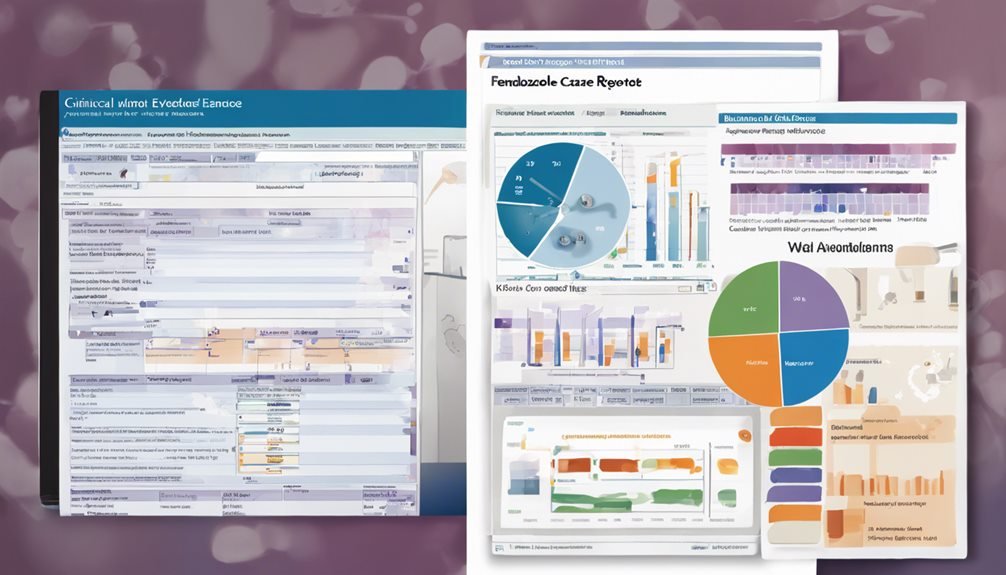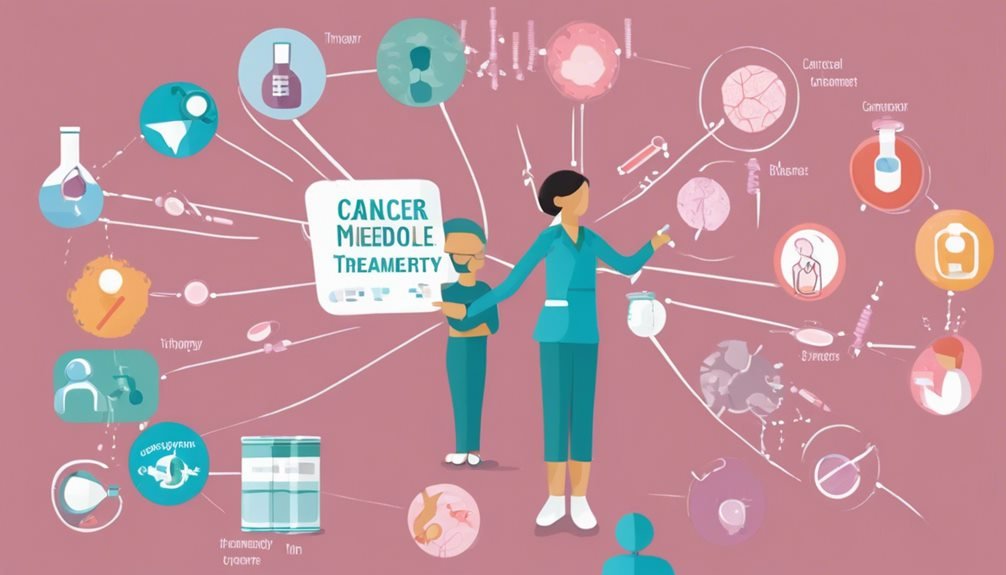Imagine a garden where weeds threaten to overtake the vibrant flowers, mirroring the unchecked growth of cancer cells in your body. Now, picture a gardener armed with a potent yet unexpected tool – Fenbendazole. As you ponder the potential implications of this unconventional cancer therapy, you may find yourself intrigued by the compelling evidence pointing towards its efficacy in inhibiting cancer progression. The intricate mechanisms at play and promising outcomes beg the question: could Fenbendazole be the overlooked key to unlocking new possibilities in cancer treatment?
Key Takeaways
- Inhibits microtubule formation in cancer cells.
- Induces apoptosis in various cancer types.
- Modulates the immune response against cancer.
- Shows anti-angiogenic effects.
- Ongoing research to understand its mechanisms in cancer therapy.
Fenbendazole's Anticancer Mechanisms
Fenbendazole's anticancer mechanisms have garnered attention due to its potential to disrupt cancer cell growth and induce cell death. Mechanistic insights suggest that fenbendazole exerts its anticancer effects through various pathways.
One key mechanism involves its ability to inhibit microtubule formation, essential for cell division, thus arresting the growth of cancer cells. Moreover, fenbendazole has shown promise in inducing apoptosis, or programmed cell death, in cancer cells by triggering pathways that lead to their destruction.
Understanding these mechanistic insights is crucial in assessing fenbendazole's therapeutic potential as a cancer therapy. By targeting specific cellular processes vital for cancer cell survival and proliferation, fenbendazole presents a unique opportunity to combat various types of cancer.
Research into its mechanisms of action continues to shed light on how this anthelmintic drug can be repurposed as an effective anticancer agent, offering new hope for patients seeking alternative treatments.
Preclinical Studies on Fenbendazole
Exploring the efficacy of fenbendazole in cancer treatment has prompted significant interest in its potential therapeutic applications. Preclinical studies have shown promising results, supporting fenbendazole's preclinical efficacy in inhibiting cancer cell growth through various mechanisms.
| Mechanism Exploration | Details |
|---|---|
| Inhibition of tubulin polymerization | Fenbendazole disrupts microtubule formation, crucial for cancer cell division. |
| Induction of apoptosis | Stimulates programmed cell death in cancer cells, leading to their destruction. |
| Inhibition of glucose uptake | Reduces glucose availability for cancer cells, hindering their energy production. |
| Anti-angiogenic effects | Suppresses the formation of new blood vessels that support tumor growth. |
| Immune modulation | Enhances the immune response against cancer cells, aiding in their elimination. |
These preclinical findings provide a foundation for further research and clinical trials to evaluate fenbendazole's potential as a cancer therapy. The mechanism exploration reveals the multifaceted approach of fenbendazole in targeting cancer cells, making it a compelling candidate for future treatment strategies.
Clinical Evidence and Case Reports

Clinical evidence and case reports provide valuable insights into the real-world application of fenbendazole as a potential cancer therapy. Patient outcomes observed in these reports shed light on the treatment efficacy of fenbendazole in various cancer types. These real-world scenarios offer a glimpse into how patients respond to fenbendazole, helping clinicians and researchers gauge its potential benefits and limitations in clinical settings.
Case reports often detail individual patient journeys, documenting their responses to fenbendazole treatment. These accounts contribute to the growing body of evidence supporting the use of fenbendazole as a complementary or alternative therapy for cancer.
By analyzing multiple case reports collectively, patterns may emerge regarding which types of cancer respond best to fenbendazole and under what conditions.
Moreover, patient outcomes reported in clinical studies provide crucial data on the overall effectiveness of fenbendazole in managing cancer. Understanding treatment efficacy in real-world settings is essential for optimizing therapeutic strategies and improving patient care.
Fenbendazole's Impact on Tumor Growth
When considering the impact of fenbendazole on tumor growth, it's essential to delve into the underlying mechanisms that drive its potential anticancer effects.
- Tumor Microenvironment: Fenbendazole has shown the capacity to alter the tumor microenvironment, making it less hospitable for cancer cells to thrive. This modification can hinder tumor growth and progression.
- Immune Response: By modulating the immune response, fenbendazole has the potential to enhance the body's ability to recognize and target cancer cells, thus inhibiting tumor growth.
- Angiogenesis Pathways: Fenbendazole may disrupt angiogenesis pathways crucial for tumor development. This disruption can impede the formation of new blood vessels that supply nutrients to tumors, ultimately slowing down tumor growth.
- Metastasis Pathways: Studies suggest that fenbendazole could interfere with metastasis pathways, reducing the ability of cancer cells to spread to distant organs. This inhibition of metastasis can significantly impact tumor growth and overall disease progression.
Understanding these intricate mechanisms can provide valuable insights into fenbendazole's potential as a cancer therapy, offering hope in the fight against cancer.
Immune Modulation by Fenbendazole

Fenbendazole's impact on tumor growth extends beyond direct effects on cancer cells. Research suggests that Fenbendazole may modulate the immune response, influencing the body's ability to recognize and attack cancerous cells. By affecting immune cells, such as T cells and macrophages, Fenbendazole could potentially enhance the immune system's ability to target tumors. Furthermore, Fenbendazole has been associated with the modulation of inflammatory pathways, which play a crucial role in the tumor microenvironment. Alterations in inflammatory signaling can impact cancer progression and response to therapy.
| Immune Modulation by Fenbendazole | ||
|---|---|---|
| Enhanced Immune Response | Modulation of Inflammatory Pathways | Impact on Tumor Microenvironment |
| Fenbendazole may boost the immune system's ability to target cancer cells. | Fenbendazole has been linked to alterations in inflammatory pathways. | Changes in the tumor microenvironment could influence cancer progression. |
Combination Therapies With Fenbendazole
Combination therapies involving Fenbendazole have gained attention in the realm of cancer treatment. When considering combining Fenbendazole with other treatments, it's crucial to understand potential drug interactions and the long-term efficacy of such combinations. Here are key points to consider:
- Synergistic Effects: Combining Fenbendazole with certain chemotherapy drugs has shown promising synergistic effects, potentially enhancing the overall treatment outcome.
- Comprehensive Monitoring: Due to possible drug interactions, close monitoring of patients is essential to ensure treatment effectiveness while minimizing adverse effects.
- Long-Term Follow-Up: Assessing the long-term efficacy of combination therapies involving Fenbendazole is vital to determine their sustained impact on cancer progression and patient outcomes.
- Personalized Approaches: Tailoring combination therapies based on individual patient characteristics and cancer types can optimize treatment efficacy while minimizing risks associated with drug interactions.
Considering these factors when exploring combination therapies with Fenbendazole can help clinicians make informed decisions to better serve cancer patients.
Fenbendazole's Safety Profile

As you explore the potential of Fenbendazole in cancer treatment, understanding its safety profile becomes a pivotal aspect in ensuring patient well-being and treatment effectiveness. Safety assessment studies have shown that Fenbendazole has a favorable long-term safety profile when used at appropriate doses. The pharmacokinetic profile of Fenbendazole reveals that it's well-absorbed in the gastrointestinal tract, reaching therapeutic levels in the body to exert its anticancer effects.
In terms of safety assessment, Fenbendazole has been found to have low toxicity levels in various preclinical studies. Additionally, in clinical settings where Fenbendazole has been repurposed for cancer treatment, adverse events have been minimal and generally mild. This indicates that Fenbendazole is well-tolerated by patients, further supporting its safety profile.
Understanding Fenbendazole's absorption patterns is crucial for predicting its efficacy and potential side effects. The pharmacokinetic profile reveals that Fenbendazole is efficiently absorbed, allowing for consistent drug levels in the body. This characteristic contributes to the overall safety and effectiveness of Fenbendazole as a cancer therapy option.
Dosage and Administration Guidelines
When considering the optimal use of Fenbendazole in cancer therapy, understanding the recommended dosage and administration guidelines is essential for ensuring its efficacy and safety. Here are some key points to keep in mind:
- Dosage: The typical dosage of Fenbendazole for cancer therapy is around 3 mg per kg of body weight per day. This dosage can vary based on individual factors, so consulting with a healthcare provider is crucial.
- Administration: Fenbendazole is usually administered orally and can be taken with or without food. It's important to follow the instructions provided by your healthcare provider or the medication label strictly.
- Treatment duration: The duration of Fenbendazole treatment for cancer can vary depending on the specific type and stage of cancer. It's essential to adhere to the prescribed treatment plan and not discontinue its use without consulting a healthcare professional.
- Monitoring progress: Regular monitoring of your condition and response to Fenbendazole therapy is critical. This can involve imaging tests, blood work, or other assessments to track the effectiveness of the treatment and make any necessary adjustments.
Patient Experiences With Fenbendazole

Understanding patient experiences with Fenbendazole in the context of cancer therapy provides valuable insights into its real-world application and effects. Patient testimonials have highlighted varying treatment outcomes when using Fenbendazole as a cancer therapy. Some individuals have reported positive responses, including tumor shrinkage, improved quality of life, and prolonged survival rates. These accounts suggest that Fenbendazole may hold promise as an alternative or complementary treatment option for cancer patients.
Patient testimonials often emphasize the importance of personalized treatment plans and close monitoring while using Fenbendazole.
It's crucial to note that individual responses to this therapy can differ, and outcomes may vary based on factors such as cancer type, stage, and overall health status.
Despite the promising reports, more extensive clinical studies are needed to establish the efficacy and safety of Fenbendazole in cancer treatment.
Potential Side Effects of Fenbendazole
Several potential side effects have been associated with the use of Fenbendazole in cancer therapy.
- Gastrointestinal Disturbances: Common side effects include nausea, vomiting, diarrhea, and abdominal pain. These symptoms usually resolve on their own but can be managed with supportive care.
- Hepatic Effects: Fenbendazole may rarely cause liver toxicity, leading to elevated liver enzymes. Monitoring liver function tests periodically during treatment is advisable.
- Neurological Symptoms: In some cases, individuals may experience dizziness, headache, or confusion. If these symptoms occur, it's crucial to consult a healthcare provider promptly.
- Long-Term Risks: The potential long-term risks of Fenbendazole in cancer therapy are still being studied. Continued research is needed to understand the effects of prolonged use.
It is essential to consider potential drug interactions when using Fenbendazole alongside other medications. Always inform your healthcare provider about all the drugs and supplements you're taking to prevent any adverse interactions.
Future Research Directions

Ongoing research endeavors are crucial in the realm of utilizing Fenbendazole as a potential cancer therapy. To advance the field, future investigations should focus on identifying novel targets for Fenbendazole within cancer cells. Understanding the specific pathways or proteins that Fenbendazole interacts with can provide valuable insights into its mechanism of action as a cancer therapeutic agent.
Exploring novel targets can lead to the development of more targeted approaches, potentially enhancing Fenbendazole's efficacy while minimizing off-target effects.
Additionally, delving into the mechanistic insights of Fenbendazole's anti-cancer properties is essential. Uncovering the precise mechanisms through which Fenbendazole inhibits cancer cell growth and induces cell death can pave the way for optimizing treatment strategies and combination therapies.
Concluding Remarks
To wrap up the discussion on the potential of Fenbendazole as a cancer therapy, it's imperative to highlight the significance of continued research efforts in unraveling its mechanisms of action and identifying new targets within cancer cells.
- Treatment Outcomes: Understanding how Fenbendazole affects various cancer types and patient populations is crucial for optimizing treatment regimens and improving clinical outcomes.
- Mechanistic Insights: Delving deeper into the specific pathways through which Fenbendazole exerts its anti-cancer effects will provide valuable insights for developing more targeted therapies.
- Clinical Trials: Conducting well-designed clinical trials to further evaluate the efficacy and safety of Fenbendazole in cancer patients is essential for establishing its place in mainstream oncology.
- Collaborative Efforts: Encouraging collaboration between researchers, clinicians, and pharmaceutical companies can accelerate the translation of promising preclinical findings into effective cancer treatments.
Frequently Asked Questions
Can Fenbendazole Be Used in Conjunction With Traditional Cancer Treatments?
Yes, fenbendazole can be used in conjunction with traditional cancer treatments as part of a combination therapy approach. Clinical trials are being conducted to evaluate the efficacy and safety of combining fenbendazole with standard cancer treatments. This approach aims to enhance treatment outcomes and potentially reduce the development of drug resistance.
Consulting with healthcare professionals about incorporating fenbendazole into your cancer treatment plan is recommended for personalized guidance.
Are There Specific Types of Cancer That Fenbendazole Is More Effective Against?
When considering the effectiveness of fenbendazole against different types of cancer, it's important to note that research has shown promising results in various cancers. Specifically, lung cancer, melanoma, triple negative breast cancer, and pancreatic cancer have been identified as types where fenbendazole may exhibit potential benefits.
While further studies are needed to fully understand its mechanisms and efficacy against these specific cancers, early findings suggest fenbendazole could hold promise in these areas.
Is Fenbendazole More Beneficial in Certain Stages of Cancer Progression?
In cancer treatment, early intervention with fenbendazole may yield more favorable outcomes compared to its use in advanced stages. This is because targeting cancer cells before they've a chance to proliferate extensively can potentially lead to better response rates and overall prognosis. However, further research is needed to establish the precise efficacy of fenbendazole in various stages of cancer progression. Consulting with healthcare providers is crucial for personalized treatment decisions.
How Long Does It Typically Take to See Results From Fenbendazole Treatment?
When starting fenbendazole treatment, the expected treatment timeline varies among individuals. Patient response can range from a few weeks to several months to observe noticeable results. Factors such as cancer type, stage, and overall health play a role in the duration to see improvements.
It's crucial to maintain open communication with your healthcare provider to monitor progress and adjust the treatment plan accordingly for optimal outcomes.
Are There Any Dietary Restrictions or Recommendations While Taking Fenbendazole for Cancer?
When taking fenbendazole for cancer, it's crucial to maintain a balanced diet rich in nutrients to support your overall health and immune system. Consider dietary considerations like avoiding processed foods and excess sugar while focusing on whole foods.
Nutritional support through supplements can also be beneficial, but consult with your healthcare provider first. Remember, a well-rounded diet can complement the effects of fenbendazole in your cancer treatment journey.
Conclusion
In conclusion, the evidence supporting fenbendazole as a cancer therapy is robust and compelling. Its diverse mechanisms of action, impact on tumor growth, immune modulation, and promising clinical outcomes showcase its potential as an effective treatment option for various cancer types. Further research and clinical exploration are warranted to fully understand fenbendazole's therapeutic benefits and optimize its use in cancer care.





